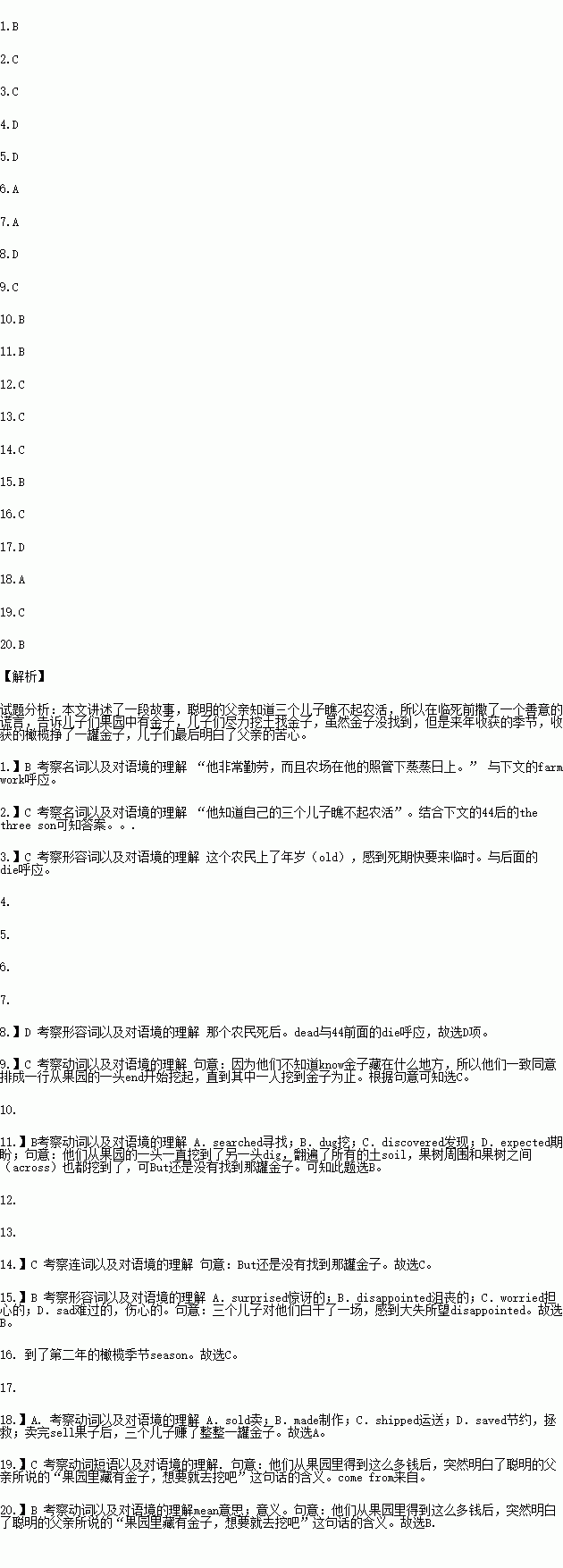题目内容
阅读下面短文,掌握其大意,然后从1—20各题所给的四个选项(A、B、C和D)中,选出最佳选项。
There was once a farmer who had a fine olive orchard(橄榄园). He was very hardworking, and the ________ always prospered(繁荣)under his care. But he knew that his three ________ looked down upon the farm work, and were eager to make wealth.
When the farmer was ________ and felt that he would die, he ________ the three sons to him and said, “My sons, there is a pot of gold ________ in the olive orchard. Dig for it, if you wish it.”
The sons tried to ________ him to tell them in what part of the orchard the ________was hidden, but he would tell them nothing more.
After the farmer was ________, the sons went to work to find the pot of gold; since they did not ________where the hiding-place was, they agreed to begin in a line, at one ________ of the orchard, and to dig until one of them should find the money.
The________ until they had turned up the________ from one end of the orchard to the other, ________ the tree-roots and between them. ________ no pot of gold was to be found. It seemed as if someone must have stolen it, or as if the farmer had been wandering in his wits. The three sons were bitterly ________ to have all their work for nothing.
The next olive ________, the olive trees in the orchard bore(结果实)more fruit than they had ________ given; when it was________ , it gave the sons a whole pot of gold.
And when they saw how much money had ________ the orchard, they suddenly understood what the wise father had ________ when he said, “There is gold hidden in the orchard. Dig for it, if you wish it.”
1.A.garden B.farm C.factory D.hospital
2.A.friends B.relatives C.sons D.children
3.A.healthy B.unlucky C.old D.sad
4.A.showed B.led C.visited D.called
5.A.sent B.put C.locked D.hidden
6.A.get B.wait C.cause D.make
7.A.gold B.goods C.jewel D.clothes
8.A.weak B.lost C.sick D.dead
9.A.think B.wonder C.know D.realise
10.A.top B.end C.surface D.bottom
11.A.searched B.dug C.discovered D.expected
12.A.sand B.ground C.soil D.floor
13.A.over B.among C.across D.round
14.A.Since B.And C.But D.Before
15.A.surprised B.disappointed C.worried D.sad
16.A.distance B.part C.season D.degree
17.A.already B.even C. still D.ever
18.A.sold B.made C.shipped D.saved
19.A.come on B.come about C.come from D.come up
20.A.thought B.mean C.planned D.guessed

